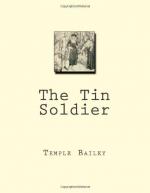And how could he know that she was at that very moment following other beckonings? That she had responded to a call that was not the call of selfish need, but of a subtle understanding of her rare charm. Bruce McKenzie had, perhaps, subconsciously felt that Emily would be fortunate to have a place by his fireside, to bask in his presence—Ulrich Stoelle leading Emily through the moist fragrance of his hot-houses counted himself blessed by the gods to have her there. “You see,” he said, “that here it is spring.”
It was indeed spring, with birds singing, not in cages, but free to fly as they pleased; with the sound of water, as a little artificial stream wound its way over moss-covered rocks set where it might splash and fall over them—with ferns bending down to it and tiny flashing fish following it.
“My father did that,” Ulrich explained, “when he was younger and stronger. But now he sits in his chair and works at his toys.”
The workshop of Franz Stoelle was entered through the door of the last hothouse; he had thus always a vista of splashing color—red and purples and yellows—great stretches, and always with the green to rest his eyes; with the door opened between there came to him the fragrance, and the singing of birds, and the sound of the little stream.
He sat in a big chair, bent a little, plump and ruddy-faced, with a fringe of white hair. He wore horn spectacles—and a velvet coat. He rose when Emily entered, elegant of manner, in spite of his rotundity.
“So it is the lady of the elephants, Ulrich? When you telephoned I thought it was too good to be true.”
“Your son says that nothing is too good to be true,” Emily told him, sitting down in the chair that Ulrich placed for her, “but I have a feeling that this will all vanish in a moment like Aladdin’s palace—” She waved her hands towards the shelves that went around the room. “I never expected to see such toys again.”
For there they were—the toys of Germany. The quaint Noah’s arks, the woolly dogs and the mewing cats—the moon-faced dolls.
“I don’t see how you have made them all.”
“Many of them were made years ago, Fraeulein, and I have kept them for remembrance, but many of them are new. When my son told me that it was hard for you to get toys, I gathered around me a few old friends who learned their trade in Nuremberg. We have done much in a few days. We will do more. We are all patriotic. We will show the Prussians that the children of America do not lack for toys. What does the Prussian know of play? He knows only killing and killing and killing.”
The old man beat his fist upon the table, “Killing!”
“You see,” Ulrich said to Emily, “there are many of us who feel that way. Yet unthinking people cannot see that we are loyal, that our hearts beat with the hearts of those who have English blood and French blood and Italian blood and Dutch blood in their veins, and who have but one country—America.”




